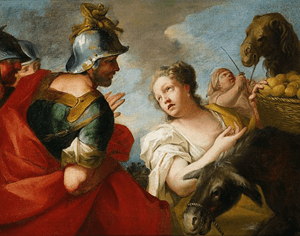
We don’t get to hear about too many female figures in the Bible, and although we may have heard the name “Abigail” widely used in today’s vernacular, we may not know much about Abigail’s story in the Bible.
Abigail stands out for several reasons. We meet her married to a rather horrible man who refuses to provide David food and shelter when David is on the run from Saul (1 Samuel 25). Instead, Nabal, Abigail’s then-husband, hurls insults at David.
Here, Abigail sends loads of food to David and asks him not to do anything rash regarding Nabal. Nabal dies at the hands of the Lord a few days later, and David marries Abigail.
Where is Abigail in the Bible?
Apart from the 1 Samuel passage above, we don’t find much about Abigail except a listing in Chronicles 3:1. In the Chronicles verse, we learn that she has a son named Daniel (not the one taken into captivity by the Babylonians).
We also learn she hails from the land of Carmel, a land otherwise known as “God’s vineyard.” This means she would’ve come from a decent amount of wealth. The banquet Nabal throws himself and the amount of food Abigail sends David seems to confirm this. Abigail also tells David not to slay Nabal because God would do the vengeance if only David would wait on the Lord.
This seems to indicate she had some prophetic giftings of some sort. The passage confirms this when she predicts David will be king over Israel. She’s described as a woman of “beauty and brains.” David is, of course, taken by her good looks, but she advises him not to take rash actions, even after he vowed to kill Nabal and Nabal’s family after Nabal insults him.
The significance of Abigail.
The story of Abigail in the Bible is an interesting one for many reasons. For one, Nabal is a rather bizarre character. For no apparent reason, Nabal refuses David’s request for food and shelter. Despite knowing David’s previous benevolence to his shepherds, Nabal churlishly refuses to aid David and his men as they try to keep one step ahead of King Saul. David’s request was not unreasonable, but Nabal, who is described as “surly and mean” (1 Samuel 25:3), essentially spits in the faces of David’s servants, saying, “Who is this David? Who is this son of Jesse? Many servants are breaking away from their masters these days. Why should I take my bread and water and the meat I have slaughtered for my shearers and give it to men coming from who knows where?” (verses 10–11).
David did not take this rejection well. He swore to kill every male associated with Nabal’s household (1 Samuel 25:22). He had strapped on his sword and was on his way with four hundred armed men (verse 13) when Abigail met him on the road. She offered David gifts of wine, grain, prepared meat, and cakes of figs. Then she fell in front of David, pleading with him to show mercy to her husband, Nabal (verse 23). In her plea, Abigail understands Nabal’s character: “Please pay no attention, my lord, to that wicked man Nabal. He is just like his name—his name means Fool, and folly goes with him” (verse 25).
In taking up Nabal’s cause and asking David to spare his life, Abigail proves herself to be a . She approaches David, an angry man bent on revenge, and intercedes for her husband, at significant risk to herself, despite his bad behavior. Her request can be seen as a picture of Christ, who offered Himself as a sacrifice to save foolish sinners from the consequences of their actions and who continues to intercede for us (Hebrews 7:25).
Abigail’s propitiation saves the day. David thanks Abigail for staying his hand and repents his foolish and rash decision to slaughter Nabal’s household (1 Samuel 25:32–34). David sees Abigail’s coming to him as a blessing from God, and he sends her home in peace (verse 35).
Meanwhile, Nabal, insensitive to his wrongdoing and the danger he had been in, holds a kingly feast for himself and gets drunk (1 Samuel 25:36). Abigail waits until the following day for her husband to sober up, and then she tells Nabal everything—how David had been on his way to destroy him and how she had saved Nabal. Upon hearing this news, Nabal falls ill: “His heart failed him, and he became like a stone. About ten days later, the LORD struck Nabal, and he died” (verses 37–38). David then sends a message to Abigail asking her to become his wife, and Abigail responds affirmatively (verses 40–42).
Scripture says that we should not seek vengeance for ourselves. Instead, we should “leave room for God’s wrath, for it is written: ‘It is mine to avenge; I will repay,’ says the Lord” (Romans 12:19; cf. Deuteronomy 32:35). This is precisely what happened in Abigail’s story. David was prevented from taking revenge, and the Lord Himself took care of the matter in due time.
David and Nabal can be seen as representative of the two responses men have to Christ. Nabal does not repent or acknowledge his sin; neither does he thank Abigail for her willingness to risk her own life on his behalf. On the other hand, David’s heart is tender and repentant, and he calls Abigail blessed for her actions. David is spared the consequences of his deliberate sin, but Nabal dies in his sin.
In the end, Nabal’s wealth, his wife, and his very life are taken from him. Abigail, a savior full of beauty, wisdom, and discretion, enters a loving relationship with David. In Abigail, we have a small picture of the ultimate Savior, the Source of beauty and wisdom, who desires a loving relationship with us forever.
Abigail’s name is mentioned in Scripture only one more time as the mother of David’s second-born son. But her story echoes in the hearts of all women as an example of true submission and courage, even in the face of danger. Abigail truly is one of the unsung heroes of the Bible.

